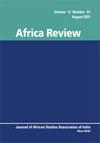土地改革,公民身份和在津巴布韦的外国人
IF 0.5
Q4 AREA STUDIES
引用次数: 6
摘要
本文探讨了土地和土地改革对“外国人”的影响及其对津巴布韦公民身份和权利的倍增效应。它还探讨了公民身份在土地、农业和外国人权利方面的争议性。这是建立在外国人与政府关系冷淡的背景下,使他们成为该国土地改革计划的受害者。移民殖民主义在一定程度上造成了当代的挑战,尽管它已经消亡,但它继续影响着政府、土著津巴布韦人和外国人之间的土地和土地争端。正是在这种背景下,这篇文章询问并讲述了津巴布韦农村包容与排斥的独特故事。该国的土地改革方案显示具有深刻的社会文化、政治和经济影响,其中一些影响现在才开始显现。本文采用强有力的基于实地的经验证据,采用解释性生活史研究方法,并使用马歇尔社会公民身份(公民政治和经济)区分的概念镜头来展示土地改革如何重新配置农村社会和经济关系。文章表明,在土地改革后的津巴布韦,公民身份仍然是一个有争议的问题,外国人在社会、经济和政治上处于不利地位,无法享受该国法律所规定的应有的权利和特权。文章的结论是,尽管津巴布韦农村存在包容和排斥的政治,但外国人继续对重新安置地区的社会经济和政治进程作出积极贡献。本文章由计算机程序翻译,如有差异,请以英文原文为准。
Land reform, citizenship and aliens in Zimbabwe
ABSTRACT This article examines the implications of the land and agrarian reforms on ‘aliens’ and its multiplying effects on citizenship and their rights in Zimbabwe. It also interrogates the contested nature of citizenship in relation to land, agriculture and the rights of aliens. This is premised on a background where a frosty relationship has existed between aliens and the government, making them victims of the country’s land reform programme. Settler colonialism is shown as having partly contributed to contemporary challenges and despite its demise, it continues to influence land and agrarian disputes between the government, indigenous Zimbabweans and aliens. It is against this background that this article interrogates and tells a unique story of inclusion and exclusion in rural Zimbabwe. The country’s land reform programme is shown as having had deep seated socio-cultural, political and economic implications some which are now only becoming evident now. The paper uses strong field based empirical evidence, adopts an interpretive life history research approach and uses the conceptual lenses of T.H. Marshall’s distinction of social citizenship (civil political and economic) to show how land reform has reconfigured rural social and economic relations. The article shows that in post land reform Zimbabwe, citizenship remains a contested issue and socially, economically and politically aliens are at a disadvantage and are failing to enjoy the rights and privileges which are due to them as enshrined in the country’s laws. The article concludes that despite the politics of inclusion and exclusion in rural Zimbabwe, aliens continue to positively contribute to socio-economic and political processes in the resettlement areas.
求助全文
通过发布文献求助,成功后即可免费获取论文全文。
去求助
来源期刊

Africa Review
AREA STUDIES-
CiteScore
1.80
自引率
12.50%
发文量
22
期刊介绍:
Africa Review is an interdisciplinary academic journal of the African Studies Association of India (ASA India) and focuses on theoretical, historical, literary and developmental enquiries related to African affairs. The central aim of the journal is to promote a scholarly understanding of developments and change in Africa, publishing both original scholarship on developments in individual countries as well as comparative analyses examining the wider region. The journal serves the full spectrum of social science disciplinary communities, including anthropology, archaeology, history, law, sociology, demography, development studies, economics, education, gender studies, industrial relations, literature, politics and urban studies.
 求助内容:
求助内容: 应助结果提醒方式:
应助结果提醒方式:


